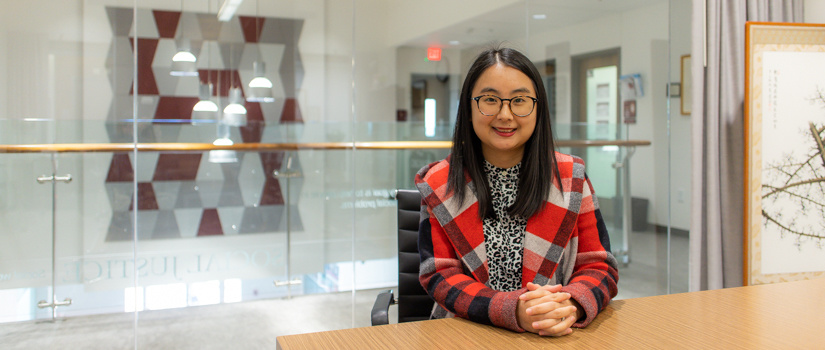Jan. 29, 2020
Chris Woodley • cwoodley@mailbox.sc.edu
In January 2019, Assistant Professor Yanfeng Xu was only five months away from earning her doctorate from the University of Maryland School of Social Work. At the same time, she had four poster presentations at the Society for Social Work and Research Annual Conference in San Francisco. Fast forward a year, and Xu returned to the SSWR Annual Conference in Washington for the first time as a professor.
“Attending conferences is an opportunity to disseminate research, network with scholars, learn others’ research projects, develop professional skills and meet friends,” Xu says. “However, the perspectives are different as a student and a professor.”
Xu added that her mindset as a professor changed this year compared to previous conferences.
“As a professor, the expectations of myself and from my colleagues are higher in how you contribute to social work research and the profession,” Xu says. “I presented with some senior faculty members in the same sessions, and their projects provided me with a vision of my career trajectory and how to make positive impacts on children and families we serve.
The other difference is to think about how to mentor students as a professor. As mentoring students is very important to me, I am now thinking of bringing my students to present a conferences next time. I benefited from my advisors’ mentoring, and now I observed how other faculty members support and present with their students and mentor junior scholars at SSWR. I just want to be one of them.”
Xu served as a faculty mentor and met with a Ph.D. student at the University of Kansas to discuss how to publish articles and search for jobs. In addition, as a member of the Asian and Pacific Islander (API) Social Work Educators Association, Xu attended an annual mentoring meeting at SSWR to share her experiences with API doctoral students.
“At SSWR, we had a mentoring matching program for doctoral students called ‘Coffee with a Scholar,’” Xu says. “I was a mentee of this program last year and now can continue this mentorship as a faculty member. More importantly, I had an opportunity to give back to doctoral students.”
Xu, whose research interests include child welfare services and policies, and foster care and kinship care, participated in three oral and three poster presentations this year. She was the presenting author in three presentations which focused on kinship care, which is when grandparents or extended family members raise children. During her presentation, “Economic Hardship and Economic Pressure, Financial Assistance, and Children’s Behavioral Health in Kinship Care and Non-Relative Foster Care,” Xu discussed how kinship care families endure more economic disadvantages compared to non-relative foster care families. She concluded that assessing caregivers’ subjective experiences of family financial well-being are important to assessing family incomes.
Another one of Xu’s presentation was “Neighborhood Disorder and Child Behavioral Problems Among Kinship Children: Mediated by Social Support and Moderated by Race/Ethnicity?” She examined how children in kinship care may be placed in similar neighborhoods as their birth families, which are predominantly characterized as distressed neighborhoods with high poverty and crime rates, stressful housing conditions, and few social resources. Xu also provided suggestions for improving conditions for kinship children, including welfare workers assessing neighborhood environments, the replication and implantation of evidence-supported programs, and neighborhood-level interventions.
“I enjoy the discussion and feedback I receive during each presentation,” Xu says. “Hearing from others who share the same research interests could take my research in a different direction and helps us work together effectively.”
Another difference from last year’s conference were workshops about National Institutes of Health (NIH) funding opportunities.
“It might have been the first time that program officers from the NIH attend SSWR to talk about grant applications and funding opportunities, which was really informative and helpful,” Xu says. “Some junior faculty also discussed how NIH-K awards further developed their research training and helped them become independent investigators. I focused more on workshops in previous conferences, but this year I attended more grant writing and funding opportunity presentations.”
With her first SSWR as a professor behind her, Xu is motivated to pursue more research opportunities.
“One of the biggest differences between now and when I was a student was how to do more research to address critical social issues we are facing and how to work with state agencies and organizations to make structural changes,” Xu says.
